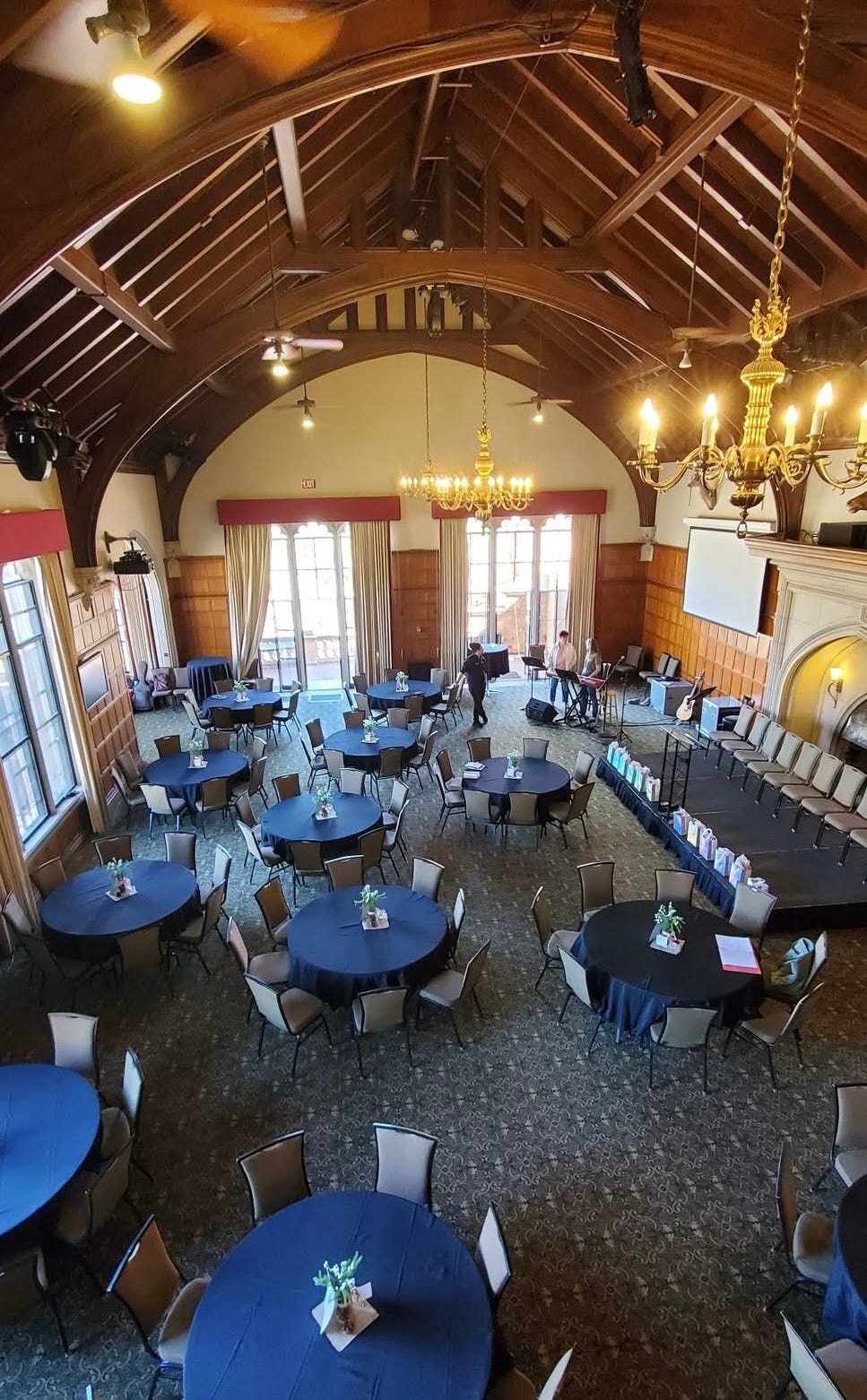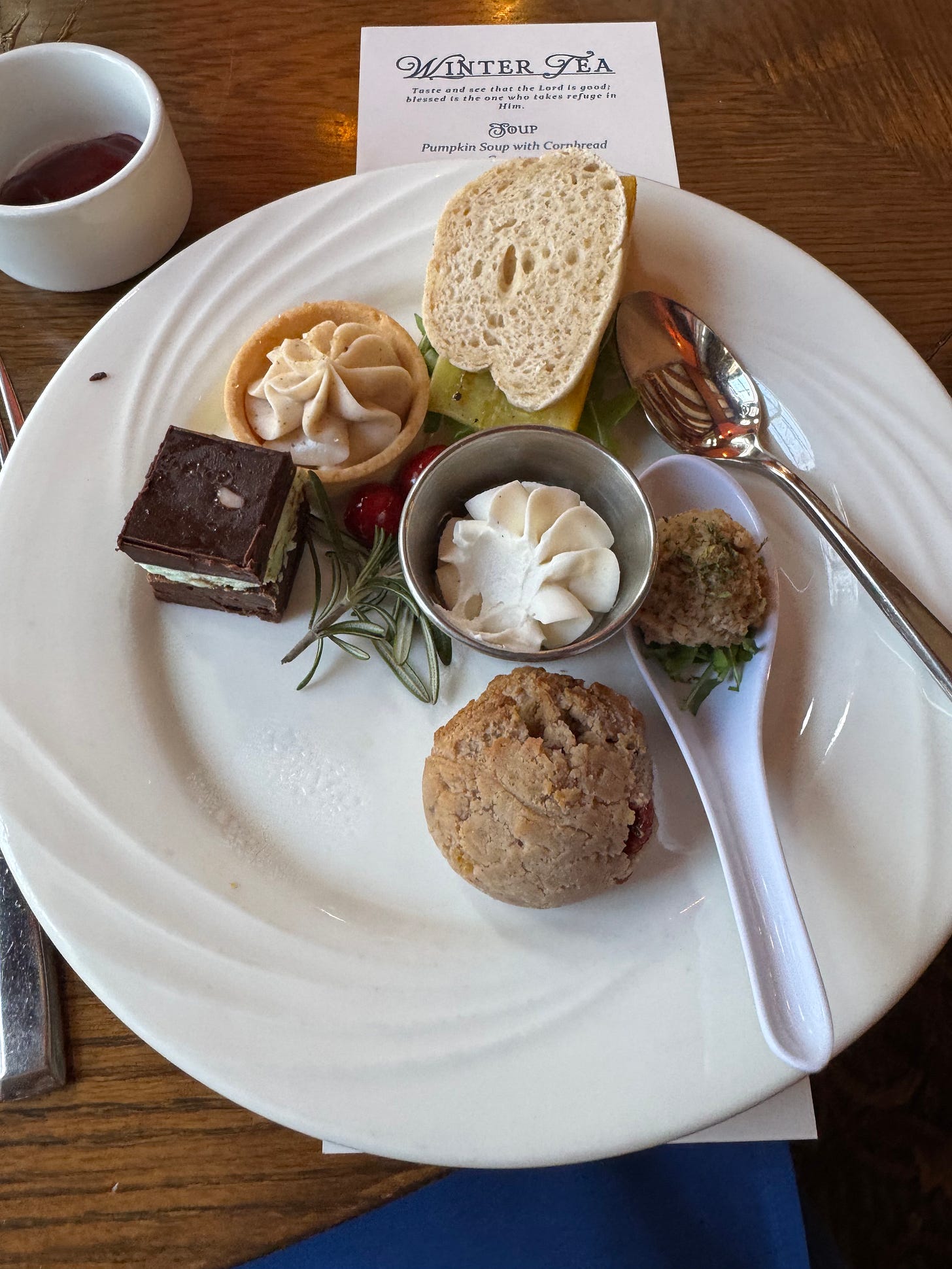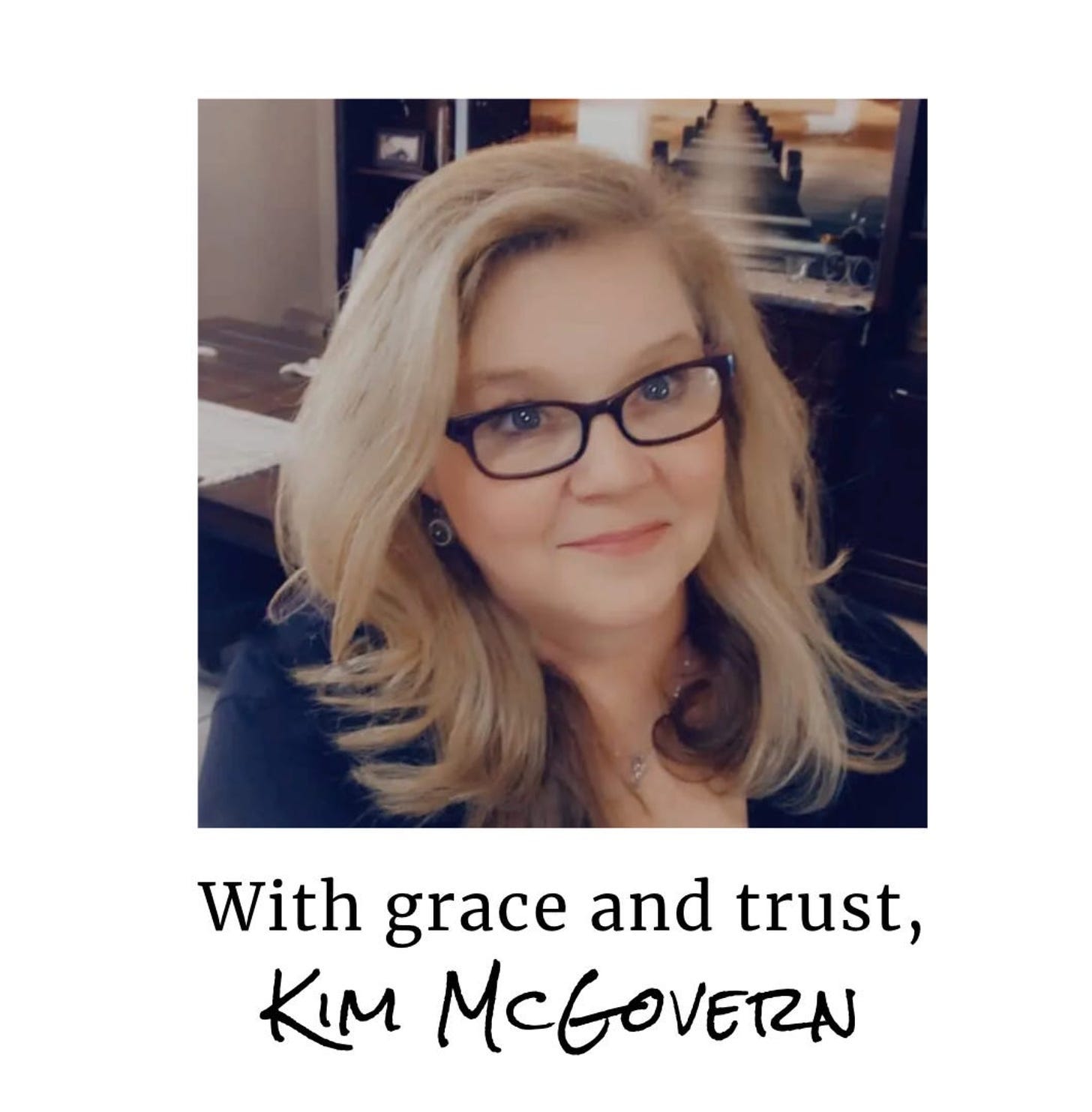When Grief Is Long, the Ground Frozen, and God Still Prepares a Table
How a Velvet Rope, a Whisper, and Two Psalms Reoriented My Winter Heart
Lines still fall in pleasant places—even when the valley won’t let go.
A Castle Room and a Velvet Rope
I boarded the plane to Colorado with more than a suitcase. I carried the weight of a weary soul—layered in grief, brittle with exhaustion, and desperate for something to thaw what had gone cold. I was longing for breakthrough—hungry for God to do something I couldn’t make happen on my own. Before I even landed, I asked Him to plow the hardened ground of my soul and plant fresh hope.
The retreat was held in a castle tucked into the mountains of Colorado Springs.1 When I was handed the key to my assigned room, I wandered through hallways until I found the door—and stopped. The room looked too pristine, too royal, too museum-like with its ornate furnishings and red velvet rope stretched across the doorway.
I hesitated.
Anyone who’s walked through museum halls knows the silent rule: a rope across the entrance means off limits. You can admire what’s inside, but you’re not meant to enter. Still, the number on the door matched the key in my hand.
Everything in me questioned it. This kind of space felt too untouched for someone carrying the kind of ache I brought with me.
But the room was mine.
I unclipped the velvet rope, let it fall, and stepped across the threshold. In that quiet crossing, something deeper shifted. Though I didn’t know it yet, I had just stepped onto holy ground.
The Ache That Lived in Me Before I Had Words for It
Long before I knew grief by its given name, I learned to live in its shadow—often taking shelter in fictional stories to catch my breath. When the world around me felt sharp or confusing, I slipped into pages filled with castles and crowns. I didn’t just read stories; I lived inside them. I walked their corridors, wore their gowns, and rewrote my sinking sorrow into something polished and presentable. At night, I’d lay my head down and imagine I was the daughter of a king—switched at birth, of course.
In high school, the stories moved from my imagination to the stage. I auditioned, memorized lines, and stepped into other people’s stories with practiced ease. Under the lights, I became someone else—carrying another’s sorrow or hope in front of a watching world. Yet, when the lights dimmed and the costume came off, one question always remained:
Where could I rest the weight of my story?
Looking back, I know it wasn’t the crowns or the castles that drew me in—it was the ache to make sense of the ache—a longing to discover a story strong enough to carry my own.
I didn’t know then that sorrow could pile up quiet as snow. I didn’t know how deep it could run—or how long it could wait before rising up, no longer content to stay buried beneath the stories that once helped you survive.
At twenty-three, I was holding two babies under two and the unraveling thread of a marriage I couldn’t hold together. The house was quiet, but inside, I was anything but. The question surfaced without ceremony: Why me? What did I do to deserve this? I wasn’t looking for pity. I was seeking something solid—something stronger than me.
That night, I met Jesus. He didn’t offer explanations or step-by-step fixes. He met me in the quiet wreckage of my sin and offered me Himself. He showed me the cross—not as a symbol of shame, but as the doorway to redemption. He didn't erase the ache; He entered it—and that changed everything. My story didn’t need a new plotline. It needed a Savior.
When Winter Settles On the Soul
Salvation changed everything, but it didn’t erase grief from my life. If anything, the deeper my faith grew, the deeper the ache seemed to settle. In the years leading up to that mountaintop retreat, layer upon layer of loss pressed in with no relief in sight. My prayers echoed the psalmist’s cry: How long, O Lord?
Eventually, the tears that once came freely, stopped altogether. It wasn’t that I didn’t love Jesus. I just couldn’t feel much of anything. The ground of my heart, once soft with surrender, had gone cold. I was going through the motions, but my soul felt brittle. I had entered a spiritual winter—what felt like the slow shutting down of my heart.
That’s what led me to the castle. I needed God to thaw what I no longer had the strength to tend. So I boarded a plane and whispered the same prayer over and over: Plow the hardened ground—help me feel again, cry again, use my voice again, and my hands to glorify you with a heart fully awake.
That first night, as worship echoed through the high-ceilinged great hall, I raised my hands in surrender. I didn’t have eloquent words or grand expectations. I only had one quiet prayer: Plow the hardened ground. And that’s where God met me—not with lightning bolts or dramatic visions, but with a whisper that landed deeper than sound:
“Daughter, I am fighting for you.”
Not past tense. Not someday. Now. I held on to His words like a lifeline and kept showing up. He knew the way through the hardened ground of my heart—and He was already breaking it open.
What Two Psalms Taught Me About Grief and God: Reflecting on Psalm 16 and Psalm 23
Maybe I’d been believing that winter had to end before I could taste anything good again—that the ache had to lift before God could meet me with joy. In the castle, in that quiet crossing from numbness to surrender, God began to show me something different. His presence wasn’t waiting for spring. It was already here, in the cold.
Psalms I’d memorized long ago began to rise like lanterns on a dark path—guiding me not out of the valley, but deeper into holy ground. Two in particular—Psalm 16 and Psalm 23—stood together, whispering the truth I needed most: this valley wasn’t a detour from His goodness or a sign of His absence. It was sacred ground, where His presence held steady—right in the middle of everything I couldn’t fix.
Here are four truths I began to see more clearly as I walked with these psalms:
God as Guide, Goodness, and Portion
Both psalms begin not with the psalmist’s needs, but with confidence in who God is. He is not only the Shepherd who leads but the portion we receive.
“The Lord is my shepherd; I shall not want. He makes me lie down in green pastures. He leads me beside still waters. He restores my soul. He leads me in paths of righteousness for his name’s sake.”(Psalm 23:1–3, ESV)
“I say to the Lord, ‘You are my Lord; I have no good apart from you.’”
“The Lord is my chosen portion and my cup; you hold my lot.”
(Psalm 16:2, 5, ESV)
The image of God as Shepherd and God as portion invites us to trust not just in what He gives—but in who He is. Psalm 23 shows us the external provision, while Psalm 16 names the internal confidence: the Lord is enough.
Security in His Presence—Even in Darkness
Both psalms acknowledge that life is not always peaceful. Though the valley of the shadow of death stretches out before us, fear does not win when God is near.
“Even though I walk through the valley of the shadow of death, I will fear no evil, for you are with me; your rod and your staff, they comfort me.” (Psalm 23:4, ESV)
“I bless the Lord who gives me counsel; in the night also my heart instructs me. I have set the Lord always before me; because he is at my right hand, I shall not be shaken.” (Psalm 16:7–8, ESV)
The nearness of God doesn’t erase suffering—but it anchors us. Whatever we are walking through, the Shepherd is beside us and like David in Psalm 16, we do not shake when He is near.
Pleasant Lines and the Surprising Table
Perhaps the most striking contrast these psalms hold together is this: God does not remove the valley before preparing the table. He does not eliminate hardship before declaring beauty.
“You prepare a table before me in the presence of my enemies; you anoint my head with oil; my cup overflows.” (Psalm 23:5, ESV)
“The lines have fallen for me in pleasant places; indeed, I have a beautiful inheritance.” (Psalm 16:6, ESV)
As many pastors and teachers have pointed out, the table in Psalm 23 isn’t set after the valley—it’s set right in the middle of it.
God’s provision doesn’t wait for the suffering to pass. He meets us in it, sustains us through it, and prepares a feast in the presence of everything that still feels frightening and unfinished.
Likewise, Psalm 16 insists that “pleasant places” are not the absence of pain, but the presence of God. These lines speak not of geography or ease, but a delightful inheritance found in knowing we are His.
The Promise of Forever
Each psalm ends by lifting our eyes—not just to current provision, but to lasting promise. Not only is He with us now, He also holds what is still to come.
“Surely goodness and mercy shall follow me all the days of my life, and I shall dwell in the house of the Lord forever.” (Psalm 23:6)
“You make known to me the path of life; in your presence there is fullness of joy; at your right hand are pleasures forevermore.” (Psalm 16:11)
Psalm 23 and 16 are what I like to call Psalms of Defiance—of stubborn hope in the face of sorrow, and steady trust in the face of shifting shadows.
🔄 Holding the Two Psalms Together
When interwoven, Psalm 23 and Psalm 16 reveal the tension—and truth—of walking with God in a broken world.
• Psalm 23 says, “Even though I walk through the valley of the shadow of death…”
• Psalm 16 says, “The lines have fallen for me in pleasant places…”
Both are true. The valley doesn’t erase the inheritance and the inheritance doesn’t cancel the valley. What anchors both is not circumstance—but God’s presence.
David isn’t saying life always feels good. He’s saying God’s nearness is the good.
The table in the valley, the cup that overflows, the boundary lines drawn by mercy, the Shepherd who walks beside you, and the portion who dwells within you—this is the inheritance.
We don’t have to choose between valleys and pleasant places. In Christ, we get both—held together by the hand that leads us through.
Living Inside God’s Story
When I crossed the velvet rope that day, I didn’t just enter a castle room. I stepped into a story I couldn’t control. I had come longing for breakthrough, aching for answers, impatient with the pace of God’s unfolding. I wanted the ache to end, the story to resolve, the winter to lift. What I didn’t want was to wait.
I was ready to write my way out of what felt like a broken narrative, but God wasn’t asking me to fix the plot. He was inviting me to live inside the story He was writing, one that could carry the weight of my own.
Dan Allender, Christian therapist, author, and professor, once said, “You are a story—a well-written, intentional story that is authored by the greatest Writer of all time… What makes your life a glorious bestseller is that the plot reveals not a mere moral or lesson but the very person and being of God.”2
I wouldn’t have written this story for myself. Yet, it was the only story that could lead me deeper into the heart of the One who holds every chapter. Dietrich Bonhoeffer once wrote: “God does not give us everything we want, but He does fulfill His promises, leading us along the best and straightest paths to Himself.”
My story has an Author—and the good news is, it isn’t me. Scripture doesn’t tell the story of people who fixed everything. It tells the story of a God who dwells with His people—even in the hardest pages. His presence is the scarlet thread that runs through every chapter:
In Eden, God walked with Adam and Eve.
In the wilderness, God tabernacled among His people.
In exile, God promised to dwell with them again.
In Christ, God moved into the neighborhood (John 1:14).
In the Spirit, God now dwells within us.
And in the end, He will dwell with us face to face.
We are not abandoned in the messy middle, we are carried, held, accompanied to the glorious end.
Amy Carmichael once wrote:
“Joy, not suffering is eteranl….Joy is given; sorrow is lent….It is lent to us for just a little while, that we may use it for eternal purposes. Then it will be taken away, and everlasting joy will be our Father’s gift to us, and the Lord God will wipe away all tears from all faces (isaiah 25:8).
So let us use this ‘lent’ thing to draw nearer to the heart of Him who was once a Man of Sorrows. (He is not that now, but He does not forget the feeling of sorrow.) Let us use it to make us more tender with others, as He was when on earth and is still, for He is touched with the feelings of our infirmities.”3
The path Psalm 16 and Psalm 23 trace—is not a bypass around the valley, but a journey through it with a Shepherd who prepares tables in dark places, a King who draws boundary lines in mercy. Until we see Him face to face, we live like people of the in-between—holding sorrow in one hand and joy in the other. And still we say:
The lines have fallen in pleasant places.
Not because the way is easy—but because He is with us.
He is both the portion and the place.
And He is fighting for us all.
Disclosure: As an Amazon Associate, I earn from qualifying purchases. This post may contain affiliate links, which means I may receive a small commission at no additional cost to you if you make a purchase through these links. Thank you for supporting this ministry.
Resources:










Thank you for sharing this hard-won wisdom - it ministered to me today .
"A God who dwells with his people, even in the hardest pages." Kim, thank you for this piece. I truly believe I needed to read this today, and I am so thankful for your words.